KSysGuard/it: Difference between revisions
Created page with ''''KSysGuard''' è progettato per offrire all'utente la possibilità di controllare i processi facilmente, senza bisogno di fare alcuna configurazione speciale - le impostazioni ...' |
Created page with '==Carico di sistema==' |
||
| Line 8: | Line 8: | ||
'''KSysGuard''' è progettato per offrire all'utente la possibilità di controllare i processi facilmente, senza bisogno di fare alcuna configurazione speciale - le impostazioni predefinite sono di solito perfettamente adeguate. Ci sono due fogli di lavoro (schede): <menuchoice>Carico di sistema</menuchoice>, visibile sopra, e la<menuchoice>Tavola dei processi</menuchoice>. | '''KSysGuard''' è progettato per offrire all'utente la possibilità di controllare i processi facilmente, senza bisogno di fare alcuna configurazione speciale - le impostazioni predefinite sono di solito perfettamente adeguate. Ci sono due fogli di lavoro (schede): <menuchoice>Carico di sistema</menuchoice>, visibile sopra, e la<menuchoice>Tavola dei processi</menuchoice>. | ||
== | ==Carico di sistema== | ||
The <menuchoice>System Load</menuchoice> screen has three displays, each representing one of the load considerations - CPU History, Memory and Swap History and Network History. If you hover over the title-bar of each section you will see detailed analysis together with a colour-key. | The <menuchoice>System Load</menuchoice> screen has three displays, each representing one of the load considerations - CPU History, Memory and Swap History and Network History. If you hover over the title-bar of each section you will see detailed analysis together with a colour-key. | ||
Revision as of 12:59, 5 October 2010
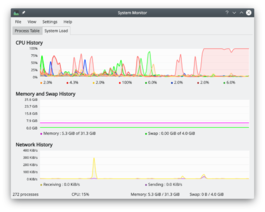 |
Segue e controlla i processi in esecuzione nel tuo sistema. |
Generale
KSysGuard è progettato per offrire all'utente la possibilità di controllare i processi facilmente, senza bisogno di fare alcuna configurazione speciale - le impostazioni predefinite sono di solito perfettamente adeguate. Ci sono due fogli di lavoro (schede): , visibile sopra, e la.
Carico di sistema
The screen has three displays, each representing one of the load considerations - CPU History, Memory and Swap History and Network History. If you hover over the title-bar of each section you will see detailed analysis together with a colour-key.
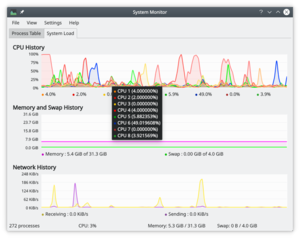 |
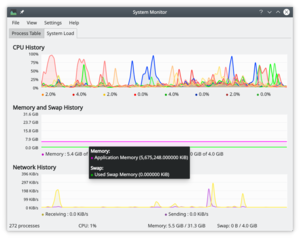 |
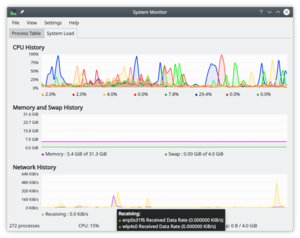 |
The Process Table
The view by default gives you an alphabetical order list of all processes running. Clicking on any column header will make this the sort column. If you have a runaway process you will find the view most useful. You can also elect to see sub-sets of the processes, by owner or program.
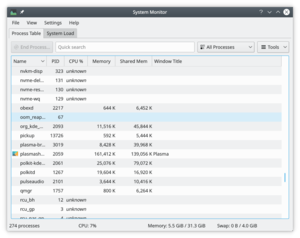 |
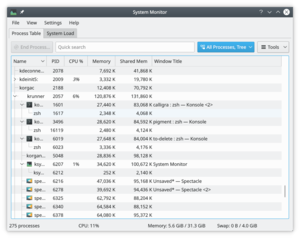 |
Hints and Tips
Ctrl + Esc brings up the Processes part of KSysGuard, which is very helpful when you are trying to find which application is using too many resources.
In KRunner (Alt + F2 or from a right-click on the desktop) there is a tiny icon to the left of the entry bar - it looks like a microwave oven - that also brings up the Process Table.
